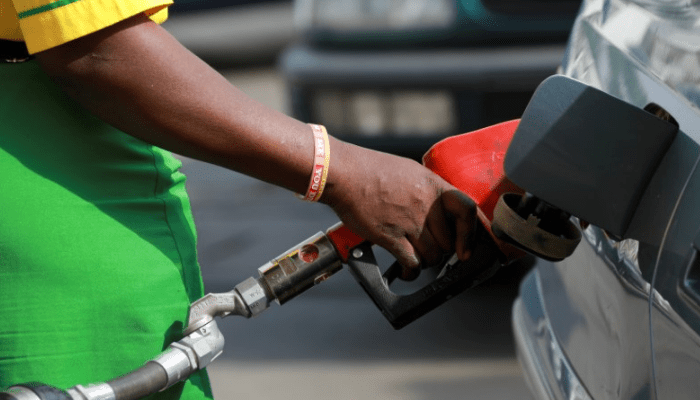
by Gift Nwachukwu | Jan 25, 2022 | Economy
The Minister of State for Petroleum Resources, Chief Timipre Sylva, says it is clear that it is not possible to remove subsidy on petroleum products due to some impediments.
He said this during a meeting with Senate President Ahmad Lawan on Monday in Abuja over the planned removal of subsidy on petroleum products by the Federal Government.
The Minister of Finance, Budget and National Planning, Mrs Zainab Ahmed, was at the meeting.
According to Timipre, it is clear that it is not possible at this time for the government to remove the subsidy.
“It is not within the contemplation now, of this administration, to remove subsidy, but of course, if there are legislative enablers that will ensure it is within the law, then I think it is a legislative responsibility.
“Subsidy removal will not happen. When you pass a law, a law is not cast in stone. In implementing the law, you now arrive at some impediments to implementation.
“We now feel we need to take care of those impediments because before subsidy is removed, there are certain things that need to be put in place to protect the people.
“We feel we need sometime to be able to put everything in place so that when subsidy is removed, it will have minimal impact on the people,” the minister said.
In his remarks, Lawan faulted the timing of the planned subsidy removal.
He said that in as much as the administration and management of subsidy on petroleum products were flawed, the President Muhammadu Buhari-led government believed that sufficient planning must be carried out before its eventual removal.
He said: “The position of everyone in government today is that, admittedly, subsidy administration and management are flawed because of so many reasons.
“Admittedly, the burden is huge and massive and there is need at one point to do away with the subsidy.
“Even though our economy is growing, we still have the challenge of getting things to be better for our people.
“A lot of us in this administration believe that the issue of removal of subsidy should be handled with utmost care, especially that sufficient planning needs to be done.”
Lawan appealed the Nigeria Labour Congress (NLC) and the Trade Union Congress (TUC) to stop their planned protest against the proposed removal of fuel subsidy.
The senate president said the move was unnecessary.
“I am taking this opportunity to appeal to the TUC and NLC to shelve this plan to go on strike or demonstration, it is totally unnecessary.
“There is not going to be removal of subsidy; so, there is no need for this. Please, let’s not create unnecessary tension where there should be none,” he said.
The Minister of Finance, Ahmed, said that the Federal Government made provisions for fuel subsidy in the 2022 Budget – from January to June.
According to her, all payments on fuel subsidy ordinarily would cease as from July 2022.
She said that in view of the timing which was “problematic”, the government decided not to go ahead with the removal of subsidy in July, particularly against the backdrop of outcomes from ongoing consultations.
She added that the Federal Government was exploring alternatives to premium motor spirit as well as pushing to step up the country’s crude oil refining capacity.
The News Agency of Nigeria (NAN) reports that the labour unions had planned to hold a protest from Jan. 27 over the planned subsidy removal. (NAN)

by Gift Nwachukwu | Jan 19, 2022 | Economy, General News, Politics
Senate President Ahmed Lawan has assured Nigerians that subsidy on Petroleum Motor Spirit (PMS) will not be removed for now as being reported by some social and conventional media.
Lawan stated this when he fielded questions from State House correspondents after a closed door meeting with President Muhammadu Buhari on Tuesday in Abuja.
According to him, Buhari has not authorised anybody to remove fuel subsidy as speculated in some quarters.
He said: “Well, it will be of interest to Nigerians to hear what I’ve come to discuss with Mr President among several other things. Many of us are very concerned with the recent agitations and protests.
“And many citizens were so concerned; our constituents across the country are very concerned that the federal government will remove the petroleum subsidy.
“And for us, as parliamentarians, as legislators representing the people of Nigeria, this must be of interest to us.
“And we’ve just finished our recess; we had gone home to our constituencies and senatorial districts.
“We felt the pulse of our people. And I found it necessary to visit Mr President, as the leader of our government and our leader in the country, to discuss this particular issue of concern to Nigerians, and I’m happy to inform Nigerians that Mr President never told anyone that the petroleum subsidy should be removed.’’
According to him, even though the subsidy on PMS is heavy, the burden cannot be transferred to ordinary citizens.
“I know and I agree that the subsidy is very heavy. But I think we must never transfer the burden to the citizens.
“I believe that we need to look at the quoted figure of may be 100 million litres that people claim we’re consuming. Is it real?” he queried.
Lawan insisted that he wasn’t convinced that Nigerians consume that much a day, adding that there may be some level of sabotage involved.
“I mean is it either under recoveries of subsidy? Is it really 100 million litres per day? How on earth are we consuming that? We need to look at this critically and see how we can find the truth.
“Because I am not convinced that within the boundaries of Nigeria we are consuming 100 million litres a day. Probably neighbouring countries may be benefiting from this. Can’t we do something about it?
“It is a failure if we are not able to control it, this particular aspect of smuggling is the petrol and then in return, push the burden to the ordinary citizen,” he added.
Lawan lauded the president for always showing concern over the plight of Nigerians.
“So, I want to commend Mr President, for still keeping this philosophy of ensuring that the most ordinary Nigerian does not suffer in any way.
“Government is meant to serve people. And the essence of government law we all know is to protect the lives and property and welfare of the people. And that federal aspect is part of the welfare.
“It may not be exactly the way we want it in the implementation of subsidy. But that is our challenge as an administration and as a government,’’ he added.
On recent remarks by some state governors, calling for immediate removal of the fuel subsidy, Lawan said:
“Well, that’s their opinion. And they had their time. They should have done something about it.
“Now we have to do something about it. I have admitted that the burden is heavy. But I don’t think that the ordinary citizen should be the one to bear the burden.
“Those of us in government should come together and find a solution to this, including the PDP states. And PDP as a political party, there must be an irreducible minimum level of partisanship.”
On the new electoral bill vetoed by the president, Lawan expressed optimism that an amended electoral bill maybe returned to the president next week for his assent. (NAN)
by Gift Nwachukwu | Jan 17, 2022 | Economy, General News
Economic experts have advised the Federal Government to ensure that the local refineries are working optimally for effective implementation of the proposed fuel subsidy removal.
The experts gave the advice in separate interviews with the News Agency of Nigeria (NAN) in Abuja on Sunday, while speaking on the proposed subsidy removal.
NAN recalls that the Federal Government in order to comply with the provisions of the Petroleum Industry Act (PIA) had announced working through a process for the removal of petroleum subsidy from July, 2022.
Dr Olanrewaju Aladeitan, an oil and gas expert, said that the impact of the subsidy removal would be minimised if both the brown and green refineries were up and running.
Aladeitan noted that an increase in the supply of the Premium Motor Spirit (PMS), known as petroleum in the country may lead to a reasonable and affordable price.
“Removal of petroleum subsidy which is a consumption subsidy if done in a truly liberalised economy is a welcome development.
“But with deregulation of the petroleum downstream sector, pricing will be determined by the forces of demand and supply.
“The implication of this for Nigeria’s fragile economy with a largely unplanned transportation network is more hardship for the citizens.
“Past experience has shown that once there is an increase in the prices of petroleum products, prices of other goods and services soar and the country plunges into unprecedented hyper-inflation,” Aladeitan said.
He said that the burden in the immediate, short and mid-term would be overwhelming and the level of poverty would be terribly devastating.
Another oil and gas expert, Mr Charles Majomi, said Nigeria had been addicted to fuel subsidy, especially, when crude oil prices were high-eating into the windfalls that should had been directed at national development.
Majomi noted that it was not the first attempt the Federal Government had attempted to wean itself from the stranglehold of this addiction.
“As ensnared in corruption as it was, it did provide a rare example of benefit to the people. Nonetheless, its removal is a bitter pill we have to swallow,” he said.
Dr Chijioke Ekechukwu, an economist, maintained that while planning to remove petroleum subsidy, the government should ensure that local refineries are working optimally.
Ekechukwu said that it would enable the country not to depend on the volatility of the international oil price.
According to him, from the economic standpoint, subsidy should not have existed at all.
“Granted that lack of subsidy would have brought more hardship to Nigerian citizens and probably led to high cost of living, but that would have made us to quicken the solutions and remedies of such high costs,” he noted. (NAN)


